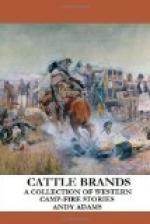“Yes, let me,” responded several.
“Which limb will be best?” inquired Mouse.
“Take this horse by the bits,” said Edwards to one of the boys, “till I look.” He coiled the rope sailor fashion, and made an ineffectual attempt to throw it over a large limb which hung out like a yard-arm, but the small branches intervening defeated his throw. While he was coiling the rope to make a second throw, some one said, “Mebby so he’d like to pray.”
“What! him pray?” said Edwards. “Any prayer that he might offer couldn’t get a hearing amongst men, let alone above, where liars are forbidden.”
“Try that other limb,” said Coon to Edwards; “there’s not so much brush in the way; we want to get this job done sometime to-day.” As Edwards made a successful throw, he said, “Bring that horse directly underneath.” At this moment Miller dashed up and demanded, “What in hell are you trying to do?”
“This sheep-thief of a sooner contests my right to this claim,” snapped Edwards, “and he has played his last cards on this earth. Lead that horse under here.”
“Just one moment,” said Miller. “I think I know this man—think he worked for me once in New Mexico.” The sooner looked at Miller appealingly, his face blanched to whiteness. Miller took the bridle reins out of the hands of the boy who was holding the horse, and whispering something to the sooner said to us, “Are you all ready?”
“Just waiting on you,” said Edwards. The sooner gathered up the reins. Miller turned the horse halfway round as though he was going to lead him under the tree, gave him a slap in the flank with his hand, and the sooner, throwing the rowels of his spurs into the horse, shot out from us like a startled deer. We called to him to halt, as half a dozen six-shooters encouraged him to go by opening a fusillade on the fleeing horseman, who only hit the high places while going. Nor did we let up fogging him until we emptied our guns and he entered the timber. There was plenty of zeal in this latter part, as the lead must have zipped and cried near enough to give it reality. Our object was to shoot as near as possible without hitting.
Other horsemen put in an appearance as we were unsaddling and preparing to camp, for we had come to stay a week if necessary. In about an hour Jack joined us, speechless as usual, his face wreathed in smiles. The first step toward a home he could call his own had been taken. We told him about the trouble we had had with the sooner, a story which he seemed to question, until Miller confirmed it. We put up a tent among the black-jacks, as the nights were cool, and were soon at peace with all the world.
At supper that evening Edwards said: “When the old settlers hold their reunions in the next generation, they’ll say, ’Thirty years ago Uncle Jack Martin settled over there on Big Turkey,’ and point him out to their children as one of the pioneer fathers.”




